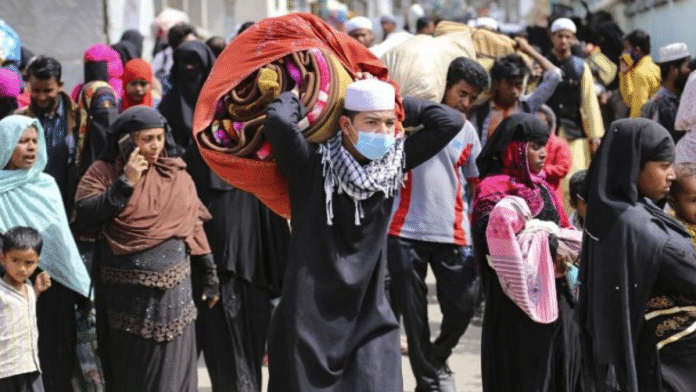On 24 July 2023, the Anti-Terrorist Squad of the Uttar Pradesh Police arrested 74 Rohingya Muslim refugees in the state, alleging that they were illegally living in India, having entered through Bangladesh.
The Rohingya crisis is a tragic situation that has unfolded over several decades, affecting hundreds of thousands of Rohingya Muslims, a minority community that mostly lives in Myanmar’s Rakhine State. Neither Myanmar’s central government nor Rakhine’s dominant ethnic Buddhist group, known as the Rakhine, recognise the Rohingyas as citizens of the country and instead consider them as “illegal immigrants” from Bangladesh.
While human rights activists in South Asia and around the world primarily approach the Rohingya refugee crisis from a humanitarian perspective, some also try to interpret it through the lens of Muslim identity, suggesting that India’s reluctance to provide them refuge is coloured by a certain religious bias. Some Indian Muslim organisations have also shown solidarity with the Rohingya community. Regrettably, national interest is once again being portrayed as a narrative to victimise and target a particular community.
Nevertheless, India’s response to this crisis is shaped by a multifaceted interplay of different factors encompassing diplomatic, humanitarian, political, and geopolitical considerations. But the most important consideration for New Delhi is national security — and rightly so, considering the history of violence associated with certain radical Rohingya groups.
Also read: India is ignoring the escalating war in Myanmar that could reignite conflicts in Northeast
Rohingyas have their own terrorists
The government’s concerns about national security vis-à-vis the Rohingya crisis aren’t misplaced. The year 1974 marked the emergence of the Rohingya Patriotic Front (RPF) — an extremist armed group ostensibly inspired by global pan-Islamist movements and driven by a deeply radical ideology. The group split in the years that followed, and, in 1982, the more radical faction known as the Rohingya Solidarity Organisation (RSO) was formed. Further splits led to the formation of the Arakan Rohingya Islamic Front (ARIF). RSO received backing from multiple Muslim groups, such as Jamaat-e-Islami (JeI) in Bangladesh and Pakistan, Hezb-e-Islami (HeI) in Afghanistan, Hizbul Mujahideen in the Indian state of Jammu and Kashmir (J&K), as well as the Angkatan Belia Islam sa-Malaysia (ABIM) in Malaysia.
In the 1980s and 1990s, the RSO maintained small bases in remote parts of Bangladesh near the Myanmar border but was not considered to have a presence within mainland Myanmar. However, in April 1994, Rohingya militants, including a group that arrived by boat in the Myin Hlut village tract in southern Maungdaw, attacked the town by planting bombs and injuring several civilians. Rohingya mujahideen targeted the town’s outskirts as well. The RSO also reportedly had operational links with the Al-Qaeda — in the 60 videotapes that CNN obtained from the latter’s archives in August 2022, one was titled ‘Burma’ and featured Muslims undergoing weapons training in RSO camps near Cox’s Bazar in Bangladesh.
Also read: Indian Armed Forces can’t turn a blind eye to religious politics anymore
The danger to Indian Muslims
Amid the ongoing debate between those arguing for humanitarian obligation and those expressing security concerns, an alternative perspective emerges. Advocates of this view argue that treating the Rohingya as illegal migrants might actually weaken India’s security rather than enhance it. They fear that targeting the group could lead to increased radicalisation within the repressed Rohingya community, which, in turn, could have significant “spillover” effects on India. The presence of a radicalised community near the border poses a serious threat not only to India but also to its diaspora residing in neighbouring nations. Consequently, they urge a careful consideration of security implications in dealing with the Rohingya crisis.
Although this argument may seem appealing, it is important to recognise that addressing threats such as the Rohingya crisis outside the border may be more feasible than allowing refugee groups to flourish within the homeland. India has already witnessed attacks by Rohingya extremists. For instance, on 7 July 2013, the Bodh Gaya blast was seen as a retaliation to the Rohingya genocide in Myanmar. Indian Mujahideen suspect Mohammed Umair Siddiqui is himself reported to have said so. In October 2014, the National Investigation Agency (NIA) arrested Khalid Mohammed in connection with the Burdwan blast — a Rohingya Muslim from Hyderabad who trained militants in Myanmar and members of the Lashkar-e-Taiba (LeT).
Besides posing a threat to national security, these radical elements also have the potential to indoctrinate and forge connections with other Muslim groups in India. This situation could lead to disastrous consequences for the Indian Muslim community and pose a larger threat to the safety of common citizens. We saw how the 2012 Azad Maidan riots unfolded. Indian Muslims who had gathered to protest against the Rakhine violence delivered inflammatory speeches, and the situation spiralled out of control. A spate of violence followed; women cops were molested, and the Amar Jawan memorial was desecrated.
The time has come for Indian Muslims to learn an important lesson. When viewing critical issues through the lens of religion, they risk exacerbating faultlines within society. Sidelining the interests of the nation and blindly supporting illegal immigrants solely on the basis of shared faith can lead to divisive outcomes. If Muslim intellectuals or leaders argue that denying illegal Muslim immigrants refugee status is injustice against them, they need to introspect and familiarise themselves with the definition of injustice itself.
Amana Begam Ansari is a columnist and TV news panelist. She runs a weekly YouTube show called ‘India This Week by Amana and Khalid’. She tweets @Amana_Ansari. Views are personal.
(Edited by Humra Laeeq)



